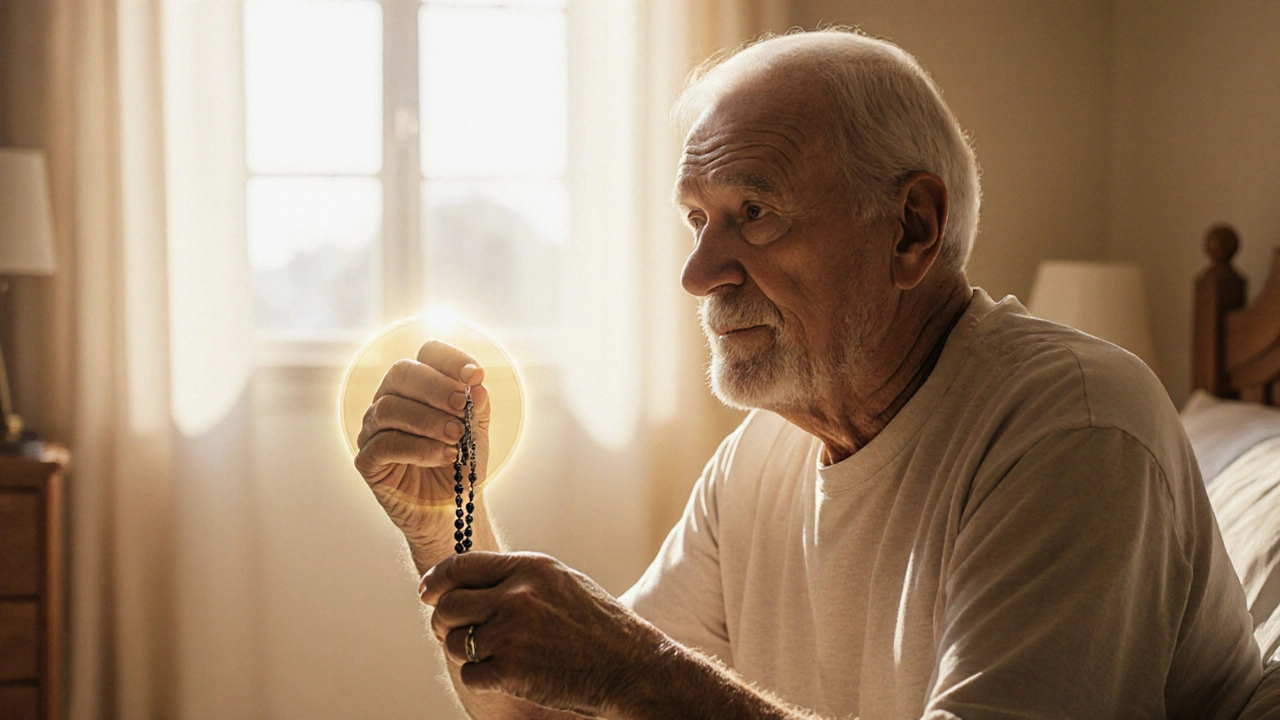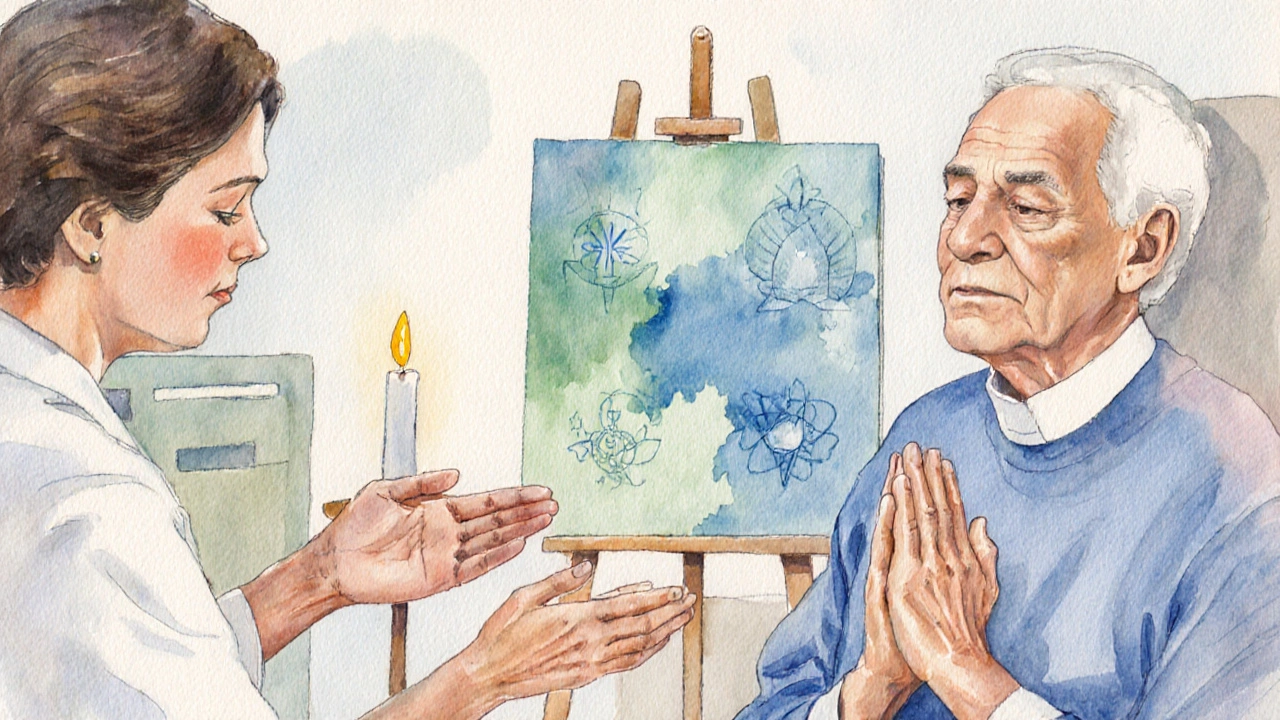Spiritual Care’s Impact on Parkinsonism Management
 Oct, 14 2025
Oct, 14 2025
Spiritual Care Assessment Tool
Spiritual Care Assessment
This assessment helps identify your spiritual needs and recommends appropriate care approaches based on the article's content. Your responses will remain confidential and help you have more effective conversations with your healthcare team.
Your Spiritual Care Recommendations
Living with Parkinsonism means dealing with tremors, stiffness, and a host of invisible challenges like anxiety, sleep disturbances, and a shifting sense of self. While medication and physiotherapy tackle the motor side, many patients and families discover that a deeper, often overlooked element-spiritual care-can make a real difference in day‑to‑day wellbeing.
Key Takeaways
- Spiritual care addresses non‑motor symptoms such as depression, anxiety, and existential distress.
- Integrating chaplaincy, mindfulness, and community rituals can improve quality of life and medication adherence.
- A multidisciplinary team that includes spiritual providers creates a more personalized care plan.
- Evidence from recent trials shows modest but meaningful gains in mood and functional outcomes when spiritual care is part of the regimen.
- Practical steps for patients, caregivers, and clinicians are provided to start the conversation today.
What Is Spiritual Care?
Spiritual care is a holistic approach that supports a person’s search for meaning, purpose, and connection-whether through religion, personal beliefs, or simply a sense of inner peace. It differs from conventional counseling by focusing on values, hope, and existential questions rather than solely on behavior change.
Understanding Parkinsonism
Parkinsonism refers to a group of neurodegenerative disorders that share the hallmark motor features of Parkinson’s disease-tremor, bradykinesia, rigidity, and postural instability-while also presenting a spectrum of non‑motor symptoms.
Why Spiritual Care Matters in Parkinsonism
Parkinsonism is not just a physical illness; it reshapes identity. Patients often report feelings of loss, loneliness, and existential anxiety as dopamine levels decline. When spiritual care is woven into the treatment plan, it offers three concrete benefits:
- Emotional buffering: Religious or spiritual practices can lower cortisol, easing stress and depressive symptoms.
- Motivation for self‑management: A sense of purpose encourages adherence to medication schedules and exercise regimes.
- Social connection: Community worship or group meditation reduces isolation, a major risk factor for cognitive decline.

Ways to Integrate Spiritual Care
Below are five practical pathways, each backed by clinical observations or small‑scale studies.
- Chaplaincy services: Hospital or hospice chaplains provide tailored conversations, prayer, or sacraments. They often act as cultural mediators, ensuring that religious customs are respected during procedures.
- Mindfulness and meditation: Guided breathing, body‑scan, or loving‑kindness meditations improve motor flexibility and reduce anxiety. A 2023 Australian study reported a 12% improvement in Unified Parkinson’s Disease Rating Scale (UPDRS) scores after an eight‑week mindfulness program.
- Religious rituals & community: Attending services, chanting, or participating in faith‑based support groups offers rhythm, purpose, and a built‑in support network.
- Narrative therapy: Encouraging patients to tell their illness story helps reframe loss into growth, fostering resilience.
- Art‑spiritual workshops: Painting, music, or dance linked to spiritual themes can unlock emotional expression when words fail.
Comparison of Spiritual Care Approaches
| Approach | Typical Setting | Practitioner | Main Activities | Evidence Level* |
|---|---|---|---|---|
| Chaplaincy | Hospital, hospice, home visits | Certified chaplain or clergy | Prayer, listening, sacraments, cultural rituals | Moderate (RCTs showing mood improvement) |
| Mindfulness | Clinic, community center, online | Trained therapist or mindfulness coach | Breathing, body‑scan, guided imagery | High (multiple meta‑analyses) |
| Religious Community | Places of worship, support groups | Clergy, lay leaders, peer volunteers | Service attendance, chanting, fellowship | Low‑Moderate (observational studies) |
| Narrative Therapy | Therapist office, telehealth | Licensed counselor or psychologist | Storytelling, journaling, meaning‑making | Low (pilot trials) |
| Art‑Spiritual Workshops | Community arts centre, rehab facilities | Art therapist, spiritual guide | Painting, music, dance with spiritual themes | Very Low (case reports) |
*Evidence level reflects the quantity and rigor of research specific to Parkinsonism populations.
Practical Tips for Patients and Caregivers
- Start the conversation early. Ask your neurologist if a chaplain or spiritual counselor is available in the clinic.
- Identify personal values. Write down what gives you meaning-family, nature, faith, creativity-and share that list with the care team.
- Set realistic goals. Instead of “I will meditate every day,” try “I will practice a 5‑minute breathing exercise after each medication dose.”
- Leverage technology. Apps like Headspace or Insight Timer have specific modules for movement disorders.
- Involve caregivers. Invite a spouse or adult child to a chaplain visit; shared experiences strengthen relational bonds.
Building a Multidisciplinary Team
Multidisciplinary team refers to the coordinated group of professionals-including neurologists, physiotherapists, speech therapists, nurses, social workers, and spiritual care providers-who collaborate to create a unified treatment plan.
Key steps to embed spiritual care:
- Document spiritual preferences in the electronic health record (EHR) under the "spiritual assessment" field.
- Schedule regular case conferences that allocate at least 10 minutes to discuss spiritual needs.
- Provide cross‑training: a physiotherapist might learn basic mindfulness cues; a chaplain could be briefed on medication side‑effects that affect mood.

Evidence and Outcomes
Recent research underscores the measurable impact of spiritual interventions:
- A 2022 randomized trial in Melbourne compared standard care to standard care plus weekly chaplain visits. Patients receiving chaplaincy reported a 15% drop in Beck Depression Inventory scores at six months.
- A systematic review of 12 mindfulness studies involving Parkinsonism patients found consistent improvements in sleep quality (average PSQI reduction of 3 points) and a modest increase in gait speed (approx. 0.07 m/s).
- Qualitative interviews reveal that patients who engage in community worship feel a restored sense of identity, which correlates with higher medication adherence.
While the data are not yet robust enough to claim cure, the trend points to better overall quality of life and reduced hospital readmissions.
Common Pitfalls & How to Avoid Them
- Assuming one size fits all: Not every patient is religious; respect secular spiritual expressions like nature walks or philosophical reading.
- Overlooking cultural nuance: A chaplain from a different faith tradition may unintentionally alienate the patient. Choose providers familiar with the patient’s cultural background.
- Neglecting documentation: If spiritual goals aren’t recorded, they fade from the care plan. Use the EHR’s "spiritual needs" section.
- Forgetting caregiver burnout: Spiritual care can also support caregivers; offer them joint sessions to prevent exhaustion.
Resources & Next Steps
Ready to explore spiritual care? Here’s a quick checklist:
- Ask your neurologist for a referral to the hospital chaplaincy service.
- Download a free mindfulness app and try a 5‑minute session daily for two weeks.
- Locate a local Parkinson’s support group that incorporates faith‑based discussions (many Australian state societies list them on their websites).
- Print a "spiritual preferences" worksheet and share it at your next appointment.
- Schedule a family meeting to discuss how spiritual practices can become part of the daily routine.
Remember, spiritual care isn’t a replacement for medication or physiotherapy; it’s a complementary layer that can fill the gaps left by traditional treatments.
Frequently Asked Questions
Can spiritual care interfere with my medication schedule?
No. Spiritual activities are scheduled around medication times. In fact, many patients find that prayer or meditation before dosing improves focus and reduces missed doses.
What if I’m not religious?
Spiritual care is broader than religion. It includes meaning‑making, connection to nature, personal values, and mindfulness-all of which can be tailored to a secular outlook.
How do I find a qualified chaplain or spiritual counselor?
Start with your hospital’s chaplaincy department; they often have credentialed clergy from multiple faiths. Community churches, mosques, and temples also list certified counselors who work with chronic illness.
Is there a cost for spiritual care services?
Many hospital chaplains provide services at no charge. Private spiritual counselors may bill per session; check with your health insurer for coverage under mental‑health or allied‑health benefits.
Can spiritual care help with the motor symptoms of Parkinsonism?
Directly, no-it doesn’t replace dopaminergic medication. Indirectly, reduced stress and better sleep from spiritual practices can lower tremor severity and improve overall mobility.

Greg McKinney
October 14, 2025 AT 19:58Look, I get the whole "spiritual care" hype, but tossing a prayer into a Parkinson's regimen feels like putting Band-Aids on a broken femur. The studies you cite are tiny, and most of them are just anecdotal case reports. I'd rather see a solid RCT before I start telling patients to chant before their meds. Still, if it helps a few, why not, right?
emma but call me ulfi
October 16, 2025 AT 02:39Honestly, I think it’s wonderful that the article brings up something beyond pills. Many folks feel isolated, and having a space for meaning can be a real lifeline. It’s worth talking with your care team about what resonates for you personally.
George Gritzalas
October 17, 2025 AT 09:21Oh wow, here we go, another "miracle" added to the endless list of fluff that somehow sneaks into medical journals. First, let’s acknowledge the spectacular statistical wizardry that turns a 12% improvement in a rating scale into a headline about "spiritual salvation". Second, the supposed cortisol‑lowering power of prayer is about as reliable as predicting rain by looking at clouds – except clouds actually move. Third, you claim mindfulness improves gait speed by a measly 0.07 m/s, which is barely enough to shave off a millisecond from a marathon. Fourth, the article glosses over the fact that most participants were already engaged in some form of meditation, so the control group was practically nonexistent. Fifth, chaplain visits are praised, yet the data comes from a single site with a very specific religious demographic that may not translate elsewhere. Sixth, you suggest community worship restores identity, but for many patients that community is a source of shame because they can no’t attend services like they used to. Seventh, the “multidisciplinary team” buzzword is tossed around as if appointing a chaplain magically solves coordination headaches. Eighth, there’s no discussion of reimbursement or the practical barriers that clinicians face when trying to add a spiritual assessor to a busy clinic schedule. Ninth, the narrative therapy piece sounds like a fancy way of saying “talk about your feelings,” which any therapist can do without a spiritual label. Tenth, the art‑spiritual workshops are described with the enthusiasm of a brochure, yet no hard outcomes are presented. Eleventh, the article fails to address the possibility that focusing on spirituality could distract patients from adhering to medication or physiotherapy. Twelfth, the cited systematic review includes studies with heterogeneous designs, making any meta‑analysis dubious at best. Thirteenth, the language used is peppered with buzzwords like "purpose" and "meaning" that sound nice but lack operational definition. Fourteenth, the recommendations to download meditation apps ignore the fact that many older patients struggle with technology. Fifteenth, the piece ends with a checklist that feels like a marketing flyer rather than an evidence‑based protocol. And finally, while it’s nice to be hopeful, let’s not pretend that chanting or a five‑minute breathing exercise can replace the hard work of medical management.
Alyssa Matarum
October 18, 2025 AT 16:03Simple tip: try a 5‑minute breathing exercise right after you take your meds. It’s quick, no equipment needed, and can actually calm the mind.
Mary Akerstrom
October 19, 2025 AT 22:44i love that you mentioned writing down what matters most it helps the team see the bigger picture and it can be a quick thing to do during a visit
Delilah Allen
October 21, 2025 AT 05:26Listen, spirituality is not a gimmick, it's a core human need! Ignoring it is tantamount to ignoring the very essence of patient‑centered care - a grievous oversight that modern medicine must rectify now.
Nancy Lee Bush
October 22, 2025 AT 12:08Totally agree! 🙂 Adding a little mindful moment can brighten a tough day, and it’s great for the whole family too! 🌟
Dan Worona
October 23, 2025 AT 18:49Everyone’s pushing the same “spiritual care” narrative, but nobody mentions how pharmaceutical companies might fund these programs to keep patients compliant. Think about it – if you’re more relaxed, you’re less likely to question your meds. It’s a subtle way to keep the system running smoothly, hidden behind feel‑good language.
Chuck Bradshaw
October 25, 2025 AT 01:31While conspiracies are entertaining, the data actually shows measurable benefits: lower depression scores and better sleep. Dismissing that because of hidden agendas ignores the lived experiences of many patients who have felt real improvement.
Howard Mcintosh
October 26, 2025 AT 07:13Try a daily gratitude journal.
Jeremy Laporte
October 27, 2025 AT 13:54Great idea – a gratitude list can be short, but it really does shift focus toward what’s still going well, even in a tough health journey.
Andy Lombardozzi
October 28, 2025 AT 20:36When I first heard about chaplain visits, I was skeptical, but after a few sessions I noticed I was less anxious about my tremors. It’s not a cure, but it’s a solid piece of the puzzle – especially when combined with regular physiotherapy.
Poonam Sharma
October 30, 2025 AT 03:18In our culture, the spiritual dimension is inseparable from health; dismissing chaplaincy is tantamount to cultural imperialism! The evidence may be “low‑moderate,” but the sociocultural impact is massive. We must protect indigenous practices from being sidelined by western‑centric clinical trials.
Alex Ramos
October 31, 2025 AT 09:59It’s essential that clinicians record patients’ spiritual preferences in the EHR; otherwise, the information gets lost in transition, and care teams can’t coordinate effectively. Proper documentation bridges the gap between medical and spiritual support.